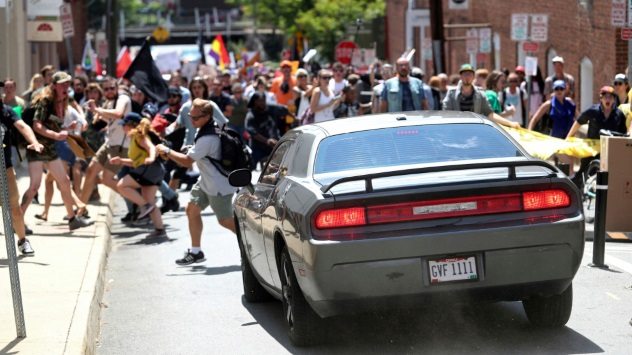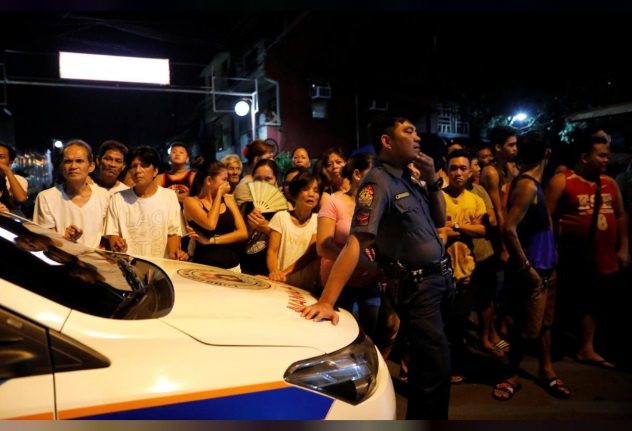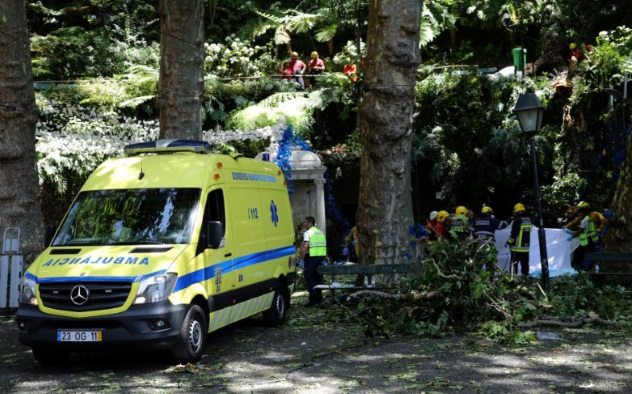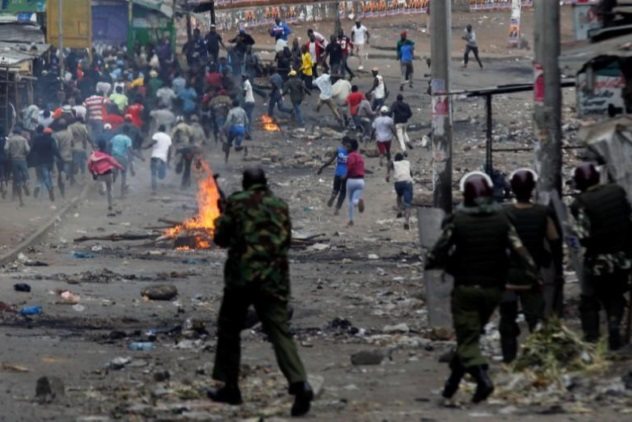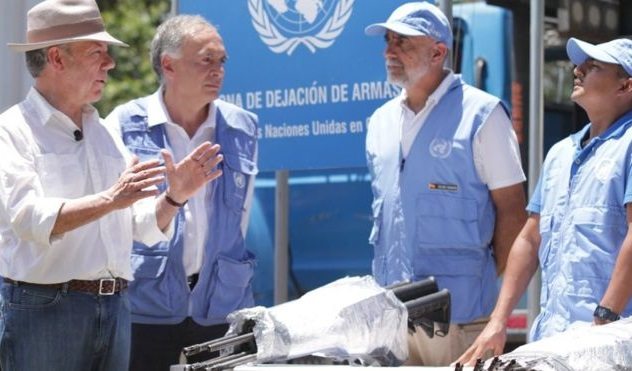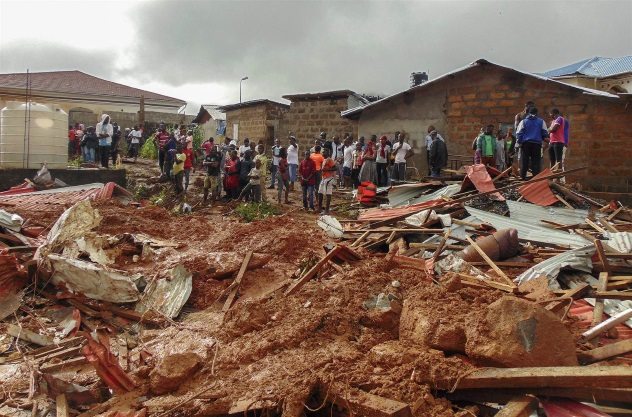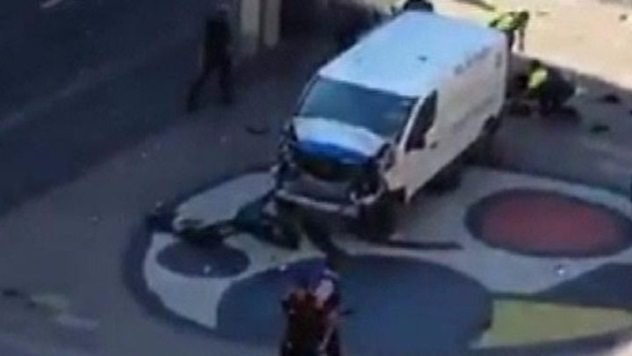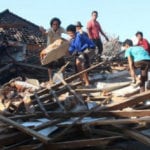10 Violent Protests And A Terrorist Attack Devastated Charlottesville
One of the grimmest things about the past two years is the way every jerk on Earth has suddenly realized that vehicles make excellent weapons. The truck attacks in Nice, Stockholm, and Berlin, as well as the three car and van attacks in London, have now been joined by yet another. This Saturday, in Charlottesville, Virginia, 20-year-old jerkbag James Alex Fields Jr. drove his car into a group of left-wing protestors, injuring 19 and killing one.[1] He has since been arrested and may be charged with a federal hate crime. The backdrop was a large protest against the removal of Confederate statues in the town. Although not conceived as a right-wing rally, it quickly descended into one, with groups like the KKK and various militia movements taking over the streets. There were clashes between left and right. Police officers were attacked. And, in the midst of it all, Fields decided to make an already bad day 1,000 times worse. To call the atmosphere in the US tense at the moment would be an understatement. There are more rallies like this planned in the near future. We can only hope they don’t all turn out like Charlottesville.
9 Freedom Of Speech Took A Beating
We wrote an article a while back where we argued that free speech means also protecting the speech of those you disagree with. Time to put our money where our mouths are. After the right-wing violence at Charlottesville, neo-Nazi website the Daily Stormer posted articles ridiculing the woman killed in Fields’s terrorist attack. The backlash was intense and immediate and forced the site off the web.[2] In doing so, it damaged free speech for us all. The people at the Daily Stormer are genuine scumbags. Unfortunately, though, the First Amendment guarantees free speech as much for scumbags as for anyone else. When website hosting services GoDaddy, Google, and Russia’s Ru-Center refused to host the Daily Stormer, they trampled on those guarantees. Cloudfare joined in the fray by removing their protections against DDOS attacks (something every site needs to function). It may be hard to get worked up over a bunch of fascists losing their free speech, but now that we’ve made it okay to silence the Daily Stormer, we’re effectively giving companies the right to decide what we can and can’t say. On top of that, we got another, scarier example of free speech being policed this week. The US Department of Justice formally requested that Dreamhost hand over the IP addresses of over a million people who visited an anti-Trump protest site. It’s feared these details could be used to identify left-wing activists and intimidate them into silence.
8 Australia Accused New Zealand Of Trying To Bring Down Its Government
Australia and New Zealand are basically the US and Canada of the Southern Hemisphere. As such, it’s extremely rare for them to fall out (outside of rugby season). This week, they did more than just fall out. Canberra accused New Zealand’s opposition of trying to bring down the Australian government.[3] The Australian government, headed by Malcolm Turnbull, currently has a majority of one in the House of Representatives. Australia doesn’t allow people with dual citizenship to sit in the House, and several Australian MPs have lost their position for holding second passports. On Monday, it was revealed Australia’s deputy PM Barnaby Joyce’s father was born in New Zealand. The problem? New Zealand automatically gives citizenship to the descendants of those born there. That makes Joyce a dual citizen and ineligible to serve in parliament—a big deal, as Joyce leaving would wipe out Turnbull’s majority. Things got crazier Tuesday. It was revealed Australia and New Zealand’s left-wing opposition parties may have colluded to reveal Joyce’s background, causing Australia’s foreign affairs minister to suggest that Wellington and Canberra’s relationship would collapse if New Zealand’s opposition won the September elections. So, to recap: New Zealand may have tried to bring down Australia’s government, and Australia may have tried to interfere in New Zealand’s upcoming election.
7 The Philippines Suffered The Bloodiest Day Yet In Its Drug War
In the single year since President Duterte launched his brutal war on drugs, over 7,000 people have been murdered in the Philippines. To put that in perspective, that’s more people than died in the actual war in Somalia in the whole of 2016. On Monday night, the violence in the Philippines reached awful new heights. The bloodiest 24 hours of the drug war so far saw 32 people executed by police.[4] This wasn’t an isolated incident. The following 24 hours saw another 28 people killed. This slightly reduced number may have upset Duterte, who had celebrated Monday night’s massacre by asking the police to kill 32 people every single night until drugs were eradicated in the nation. At this point, Duterte has effectively given police officers carte blanche to do whatever they like to suspects. Human Rights Watch has recorded cases of police falsifying evidence to justify killing innocent civilians. Duterte’s response to these concerns? On Thursday, he gave police the okay to kill any human rights activists who get in their way.
6 One Of China’s Biggest Crime Writers Was Unmasked As A Genuine Criminal
Liu Yongbiao was a rising name on the Chinese crime-writing scene. The up-and-coming author had one of his first novels turned into a 50-part TV series and had acquired a growing fan base. At the end of his last book, he teased the plot of the next: a tale about a successful crime writer who kills people and never gets caught, despite writing a popular book about it. Want to guess what happened next? On Friday night, Liu was arrested for the murder of four people in 1995. All four died on the same night, bludgeoned to death in what appeared to be a hotel robbery gone wrong. When Chinese police arrived at the writer’s residence, Liu allegedly told them, “I’ve been waiting for you here all this time.”[5] As bizarre as Liu’s story is, it’s not the only example we have of a crime writer committing a dreadful act and hiding it in the pages of their fiction. In 1992, Dutch writer Richard Klinkhamer wrote a book in which he killed his then-missing wife. Not long after, she turned up dead, murdered by—you guessed it—Richard Klinkhamer.
5 Robert Mugabe’s Wife Was Arrested For Assault
You don’t need us to tell you that Grace Mugabe is an awful human being. She’s married to Robert Mugabe, a man who makes Kim Jong-un look like the definition of “sane and reasonable.” But there’s intellectually knowing she’s disgusting, and then there’s reading about a recent example of it, like the one that took place in South Africa last Sunday. The details are a little sketchy, but it seems Mrs. Mugabe got into a fight with model Gabrielle Engels, who was staying at the same hotel. The dictator’s wife accused her of partying with her sons, then grabbed an electrical cord and beat Engels savagely with the plug end, leaving the model with deep gashes in her head. When Engels tried to have Grace booked for assault, Mugabe claimed diplomatic immunity.[6] The furor threatens to destabilize relations between Zimbabwe and South Africa, especially if a prosecution goes ahead. On the other hand, letting Mugabe get away with such a brazen assault would send the message that you can do anything you like to a South African citizen, on South African soil, and still get away with it.
4 A Falling Tree Caused Carnage At A Portuguese Religious Festival
Sometimes, we can just be in the wrong place at the wrong time. That’s what happened to worshippers at a religious festival on the Portuguese island of Madeira on Tuesday. During celebrations in the wooded hills above the capital of Funchal, a giant oak tree suddenly collapsed, falling onto the crowd below. Thirteen people were instantly crushed to death, with another 49 left injured.[7] The festival was part of the Catholic nation’s annual celebrations of the Assumption, when the Virgin Mary rose into Heaven. Parties such as the one above Funchal are common across Portugal, though few are quite so big, which is what made the tree’s collapse so tragic. In such a crowded space, those below had nowhere to run to. Local media later reported that the tree was rotten and that no foul play was suspected. Still, it’s heartbreaking to think that, had the tree chosen to collapse one day earlier or one day later, there would likely have been no one underneath, and 13 people would be alive today.
3 Kenya’s Election Was Heavily Disputed (Again)
In 2007, Kenya’s national election unexpectedly devolved into a melee of violence that killed over 1,200 people. Since then, tensions have risen markedly around election time, and this year was no different. When Kenyans went to the polls on August 8, many expected violence. Instead, they were pleasantly surprised to witness a peaceful election that international observers—including the UN, USA, EU, and African Union—declared fair. And then the results were formally announced last Friday, and everything started to fall apart.[8] President Kenyatta won the vote against an opposition headed by Raila Odinga. This was not unexpected. Odinga has lost four presidential races by now. Unfortunately, Odinga is a politician who likes to blame his losses on corruption, vote manipulation, and shadowy forces subverting democracy. Each time he does so, violence ensues. Pro-Odinga riots broke out over the weekend, resulting in 24 deaths and hundreds of injuries. One of the victims was a six-month-old baby girl, who was beaten to death by a police officer. Odinga has since called for nationwide strikes and sworn to take his case to the Supreme Court, a move that could well lead to more violence in the coming days.
2 Colombia’s FARC Finished Disarming
They were once the best-funded terrorist group on the planet. The Revolutionary Armed Forces of Colombia (FARC) spent over 50 years engaging the Colombian state in a bloody war that left a quarter of a million dead and around five million refugees in their own country. Last November, the Colombian government finally signed a peace deal with the group, thereby ending the deadliest front in the ongoing civil war. (At least one other major rebel group, ELN, continues to fight on.) Now, nine months later, the process of winding down the insurgent group is over. On August 16, FARC handed over the last of their weapons to the UN. Along with the rest of the group’s decommissioned guns, they will be melted down and turned into monuments to be placed in Bogota, Havana, and New York.[9] The handover marks the end of a transition period many never expected to work. While some FARC weapons caches still remain in the jungle, their locations have been handed over to the UN, who are in the process of destroying them. Now begins the hard work of reintegrating 7,000 former FARC soldiers into public life.
1 Sierra Leone Suffered A Horrific Landslide
Worse than Ebola. Worse than the civil war. Those were the descriptions offered by authorities at the Freetown mortuary in Sierra Leone following the devastating landslide in the early hours of Monday morning. After heavy rainfall, the sides of Sugar Loaf mountain gave way in a cataclysm of mud and rushing water. Entire communities on the edges of the capital were buried. Whole houses were washed away. At the time of this writing, over 400 people have been confirmed dead, with at least another 600 still missing. In the coming days, the death toll is expected to rise.[10] The casualties have left local facilities overwhelmed, and bodies have had to be buried in mass graves. Around 100 children have been brought in among the dead, and still the corpses keep washing up. For a country that is recovering from an Ebola epidemic that killed 4,000, this new tragedy couldn’t have come at a worse time. Fittingly, the government has announced seven days of national mourning for those killed in the new disaster.
+ Terrorism Came To Barcelona
As this column was being written, news broke from the Catalan city of Barcelona in Northern Spain. A van had driven at high speed through the crowded pedestrian thoroughfare of Las Ramblas, crashing into bystanders. Las Ramblas is the busiest street in a hugely busy city, a magnet for both tourists and locals working in hospitality. It’s clear that the driver intended to kill as many people as possible.[11] This is the first significant terrorist attack in Spain since the Madrid train bombings in 2004 killed nearly 200 people. While the death toll of Thursday’s attack is much lower, it’s still sickening. The last time terrorists killed multiple people in Barcelona was in the summer 1987, when Basque separatist group ETA destroyed a department store with a car bomb. Fast-forward 30 years, and there’s blood on the streets of the Catalan capital once again. Over the next couple of days, it sadly seems likely the death toll will rise. We will learn more about the suspect and his motives, and some vile group will assume responsibility. For now, though, all that must take a back seat. Today is the time to focus on the victims, who were doing nothing worse than simply enjoying their city when they were cruelly murdered. Our thoughts and prayers are with them and their families at this awful time.
